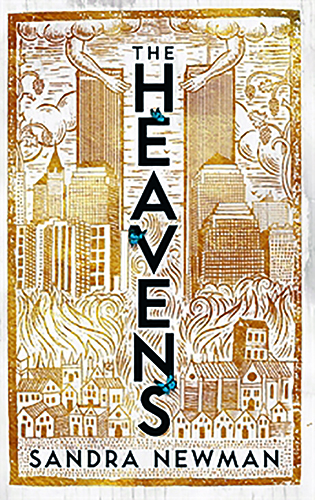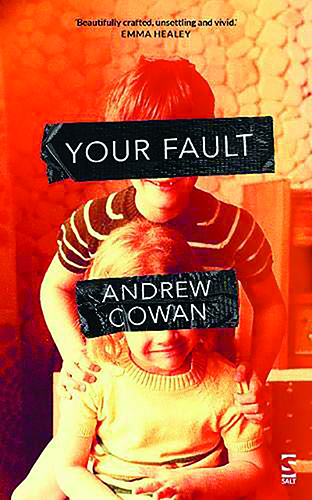The opening chapter of Sandra Newman’s fourth novel The Heavens sets the scene in a number of ways. In the rarefied glow of a late summer New York party illuminated by tea lights, two spontaneous, attractive people, pregnant with happy expectation, begin to fall in love. The night is one of “receptive postures and parted lips; such an easy blessedness, like ascending a staircase into the air”.

The heady intoxication of this evocation is typical of Newman’s sumptuous, multi-layered novel, in which both the writing and the characters shimmer and spin; sometimes joyfully, sometimes in a panic. The tone changes as different voices take hold of the narrative – the contained Jay McInerney-like mixture of elegance and awe gives way to the splintered prose of a chaotic mind. But what sustains is Newman’s brilliant gift as an artful wordsmith who never loses her cool, despite the numerous psychological states her novel seeks to convey.
The results are increasingly alarming, as America becomes more troubled and divided.
The Heavens is billed as ‘a story of love complicated by time travel’; strictly, you could describe Jenny Erpenbeck’s unforgettable The End of Days in the same way, and in that case too, the suggestion of light whimsy would be highly misleading. It begins in new millennium New York, in a utopian America in which the president is an environmentally savvy woman leading her country in a time of unity and optimism. Kate, a bright and beautiful artist, has nightly dreams in which she is ‘Emilia’ in 1593 England, mistress of various members of the Elizabethan court and friend of unknown playwright Will Shakespeare. The country is battling the plague, and Emilia becomes committed to her super-heroic mission to save the planet.
The charmed modern world inhabited by lovers Kate and Ben begins to alter each time she awakes, seemingly due to her actions in the dream. The results are increasingly alarming, as America becomes more troubled and divided. Yes, it sounds like intriguing hokum, but make no mistake, this is a profound, serious novel, whose initial brio feels in hindsight like a delicious pink puff of candy floss too sweet to be fully consumed, quickly discarded to shrivel in the rain.
Some readers have lost patience with the novel’s perpetually shifting perspectives and time zones, regularly re-set according to the augmenting ‘holes in the fabric of Kate’. For me, it maintained its intrigue and growing sense of tragic horror almost until the (slightly weak) end. Newman is a clever and sophisticated writer; she enjoys introducing what look like clichéd portals to hoary tropes (such as references to the gleaming Twin Towers in summer 2001) so that she can confound your expectations. As an imaginative illustration of the ungraspable, self-fixated and sometimes perversely magical symptoms of mental illness, this haunting, pervasively sad novel hits a particularly vulnerable nerve.

Corby writer Andrew Cowan made a big splash with his 2002 debut, coming-of-age tale Pig. His new novel, Your Fault, is just as good as that touching, insightful book. It begins with the adult Peter reminiscing with his two-year-old self, comparing how he once saw things and how he sees them in hindsight, with each chapter moving the story on a year. His parents’ troubled marriage, his gradual understanding of the fallibility of adults, his young self’s guilt and confusion as he navigates his way into teenagedom – all are portrayed with intelligence, honesty, and great tenderness. If clarity of recollection is an art, Andrew Cowan is a master.









